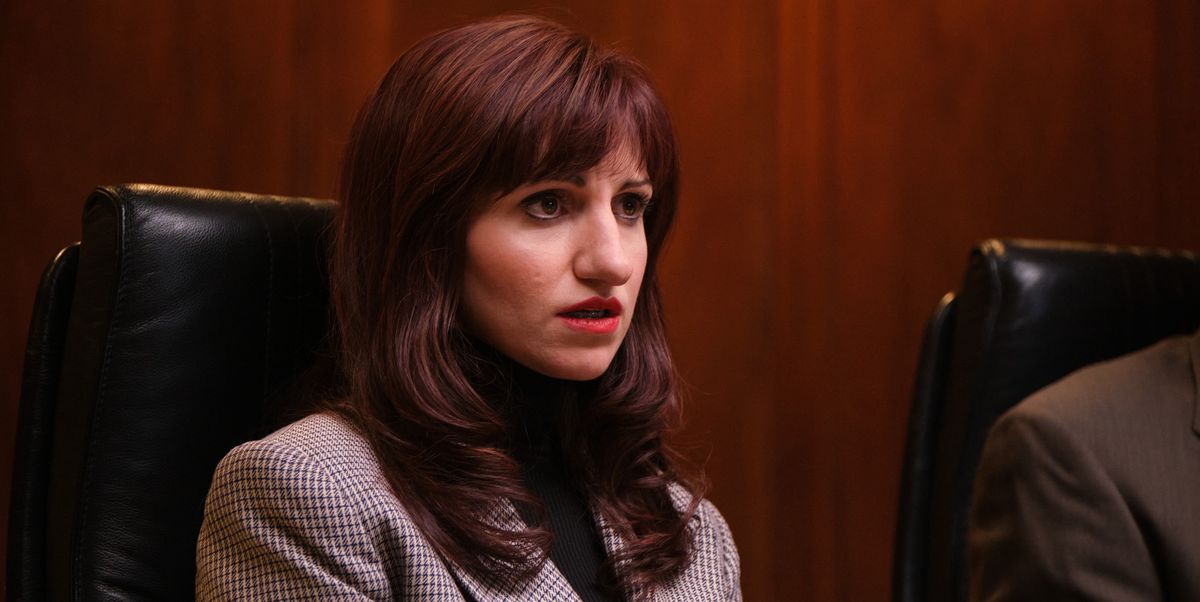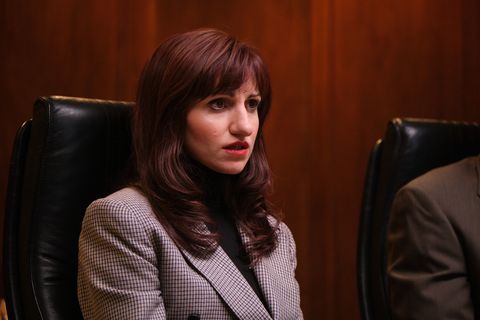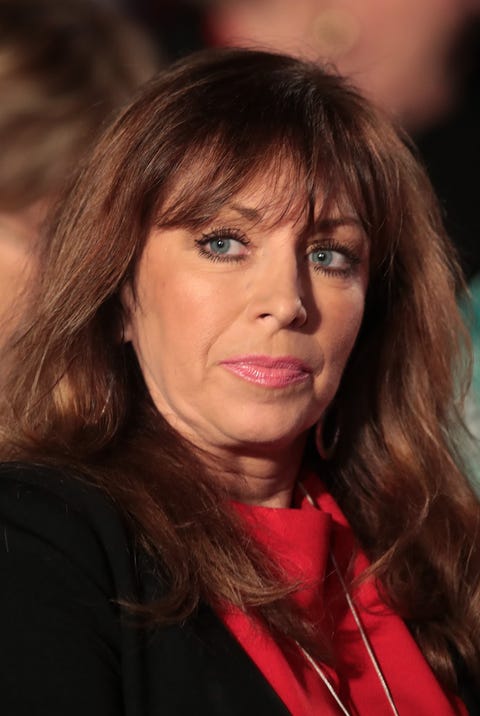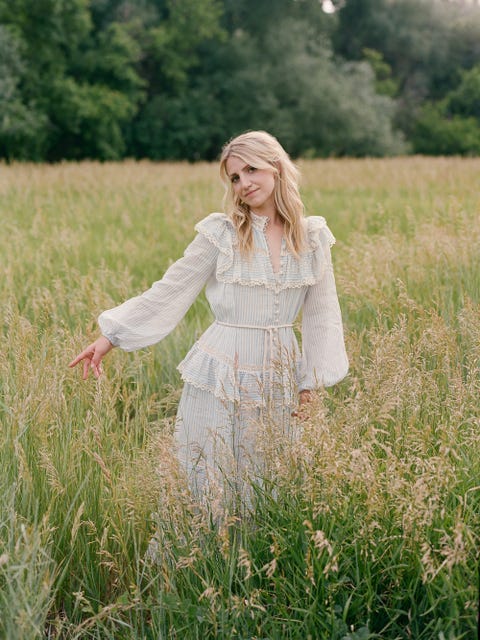It is just days before the Tony Awards would celebrate Broadway’s eagerly anticipated return after going dark for 17 months, and Annaleigh Ashford, who earned the coveted award in 2015 for her performance in You Can’t Take It With You, is giddy with appreciation when we hop on a Zoom call together. That’s partly because the live ceremony, which aired on September 26, marked an IRL reunion with some of her thespian friends. It’s also because, even throughout the hellscape that was 2020 (and still going strong in 2021), she’s stayed employed, healthy, and generally happy.
“I have always chosen to live in a place of gratitude, choosing to find the glass half full,” she tells ELLE.com from Los Angeles. “At the beginning of the pandemic, we watched people struggle with the fear of not having a job. I think, as artists, we’re so used to that place of uncomfortability. I’m really good at a pivot and at gratitude.”
This relentlessly sunny and sincere disposition comes in handy throughout Ashord’s portrayal of Paula Jones in Impeachment: American Crime Story. Not the 2016 Paula Jones, who publicly aligned herself with Donald Trump at the 2016 presidential debates. Rather, the Paula Jones of decades prior, the timid Arkansas state employee whose politics in 1994 were, as the actress suggests, less defined and who was the first to publicly accuse former president Bill Clinton of sexual harassment. Ashford’s portrayal is at once empathetic and wide-eyed, depicting Jones as a far-too-trusting woman whose mere desire for validation was met with disgust, ridicule, and disbelief.
“She was made fun of ruthlessly by the media,” says the Denver native, who pored over myriad documents and interviews in preparation for the role. “And she was also manhandled aesthetically by the political operatives that were using her for other people’s agenda.” The performance called for multiple wigs, prosthetics, as well as braces to detail Jones’ nose job, hairstyle changes, and teeth realignment that she underwent to become more favorable to the vicious, white male-led political and media landscape she was up against at that time.
On one hand, Jones’ allegation challenged a patriarchal system that was never meant to be rattled. But on the other, it led women within the political sphere—including civil servant Linda Tripp (Sarah Paulson), White House intern Monica Lewinsky (Beanie Feldstein), Clinton campaign worker Kathleen Willey (Elizabeth Reaser), Jones’ lawyer Susan Carpenter-McMillan (Judith Light)—to betray and manipulate each other.
Ashford reflects on navigating Jones’ conflicting politics, balancing camp and drama, and her big screen debut as Carrie Bradshaw’s Starbucks-slurping employee candidate in the first Sex and the City film.
With Impeachment—a retelling of everything that led to Bill Clinton’s impeachment trial—I am experiencing this story very differently now than the way I was as a teenager.
Yeah, I feel the same. I was a kid when this was all unfolding (I like to use the word, “unraveling”). I really saw this story through the lens of, first, the late-night talk shows and comedy shows. Then, through the lens of the mass media and tabloid coverage—through the covers of magazines at the supermarket. And I think what’s important about our refocusing of the story. We’re showing the story through the lens of the women involved. They were not only silenced, but their perspective and point of view were ignored. Because of that, their narratives and motives were lost. In the case of Paula Jones, I think what’s been most surprising to people as they’ve watched the show is how attached her motive was to her husband and pleasing her husband. It’s really made people reevaluate the way that they behaved and reacted and adjusted the story during that time.
I don’t remember a whole lot about her, honestly. Once the affair with Monica Lewinsky came out, that was the story. It took precedent.
I mean, once we had salacious details about his sexual life in the Oval Office with Monica Lewinsky, it just took over the new cycle for an entire year. This season forces us to acknowledge how uncomfortable we are as a culture and a society with sexual tidbits about other people’s lives, which is something that I think we have to reckon with. The Ken Starr report reads like 50 Shades of Grey.
That is so shocking to me, as an adult now. No wonder everybody was on the internet reading it. And it was the first time people could get on the internet. Isn’t that amazing? It was the beginning of people bullying on the internet. Monica Lewinsky was the first person bullied on the internet. But in terms of Paula Jones, she’s the first domino that brought down the house of cards. She was that first string that unraveled the tapestry of the Clinton administration. Without her coming forward, he never would have got caught in a lie at all.
So, what drew you the character?
When Paula Jones came up for me as a possibility to play her, it was like one of those gifts of a lifetime as an actor. Not only is she extremely specific and dynamic and larger than life, but she’s also an interesting character to play. She also has such a vulnerable energy and heartbreaking story that, in my opinion, people are not aware of. In reading that first script, I had so much empathy for the character and the real-life person. I got to put on my wig and prosthetic nose and my clothes. I just felt like it was like one of those dream jobs. By the time we were done filming and I’d look in the mirror, she felt like an old friend, which feels good as an actor.
There’s this sense of naivete with both Paula and Monica. With Monica, age is a huge factor. There were times when I am definitely side-eyeing her poor decisions. But with Paula—a woman who obviously has a family, she’s married, she’s older—where do you think her naivete comes from?
When I would watch video clips of Paula in my research, there was always this childlike energy about her. I always felt that that came from her motive to please her husband, to please the people around her. She was also a woman who grew up in a family of six. Her dad was a preacher of the Church of the Nazarene. So, she was taught to please—and to please the men in her life, to please her husband. In those first couple interviews that you see of her, she has no media training. She would have never expected to have gotten up in front of a room full of men and talk about how she was sexually harassed by the most powerful man in the country.
And she had no language for it. Any one of us would feel vulnerable and uncomfortable getting up in front of a room full of men, especially when we were given no tools. It’s just like a lack of experience, a lack of knowledge of the political arena that she was thrust into.
Would you say she had no political agency? How would you describe her own politics at that time?
I think when Paula Jones first started her journey into this political circus, she had no political agenda. I think her husband certainly did. But I think as time went by—and she was molded and shaped and pushed and pulled and then obviously had, from her account, a very uncomfortable experience with the president—all those things led her more to the right. Obviously, she was used by the right as, I think, a tool for their agenda.
I think most viewers think of Paula Jones immediately from her appearance at the 2016 presidential debate. Because that’s the last time that we saw her in a national spotlight. That was such a political move that we just think of her as a political right-wing operative. But at the start, I don’t think that was her intention. I think she really had no political intentions. I think her intention was to please her husband and to get an apology. Her husband wanted her to get an apology, so that it cleared him of looking like his wife did anything with anybody.
Paula is accusing one of most powerful men in the world at the time of harassment. That seems in conflict with any conservative or traditional upbringing or lack of political perspective she may have had at the time.
I think that any woman who has been in a situation where they feel like they’re sexually harassed, they want validation. They want healing. They want confirmation of the bad behavior. But I think there’s a thread of that always there for Paula that somebody did do something wrong to her; she does have a very emotional, visceral response. Even though she has such a clear story that she repeats over and over again, especially in those earlier interviews, it’s still gripping to watch her recount her point of trauma.
So, I think she wanted an apology and some resolve. But I think you’re right. If it wasn’t for her husband pushing her, I don’t think she would have ever said anything. I think it just would have been something she would have gone to the grave with and maybe told a few girlfriends about that made her uncomfortable, which is also heartbreaking and a sign of the times and the more male-dominated world that she grew up in.
This male-dominated world also impacted the way the women treated each other. The relationships between Linda and Monica, Linda and Kathleen, and Susan and Paula all involve manipulation and betrayal. Did that stand out to you when you first read the script?
I think that when a woman is in a world so dominated by men, she has fewer options, fewer tools, and so on. Fortunately, I think a lot of the women in this story, when they’re trying to get what they need or want, they advance their objective sometimes at the cost of the relationships with the other women in their lives. I think both Linda and Suzy, in in their faux maternal relationships, were really just trying to get what they wanted desperately, and it was at the cost of these women.
And in some weird way—because Judith Light is such a brilliant actress, Sarah Paulson is giving one of the performances of a lifetime—we’re watching them play these possibly villainous characters as humans and we still empathize for them. The fact that we still have empathy for Suzy and Linda is just a testament to the writing, to these two women’s performances. And Beanie is giving such a beautifully crafted, dynamic view of a young woman and empathy for what it is to be a young woman. We just feel for her.
Each Ryan Murphy-created show, even the most serious series like this one, has a bit of camp. Like, when Paula and her husband, Steve [Taran Killam], are trying to negotiate for him to get la walk on role on Designing Women. How did you balance that sense of camp while portraying empathy for the character?
Anytime there were beats of comedy throughout the show, Taran Killam, the brilliant Judith Light and I were really careful about making sure that we played them beyond honest. They had to be dead serious. There was no element of comedy (and the best comedy is dead honest). I’m so grateful that I had so many just delicious days with the two of them. We would laugh and have so much fun. It was so challenging filming this through some of the most incredibly difficult moments of COVID. And we would be put in separate rooms and between takes and got to hang out with each other.
But when we got to be on set together and it was time to film, we had just a blast. We would laugh so hard and there was this unspoken commitment to making sure that it was bone dry, so that nothing ever came off like a joke. Because any of those beats of camp were reality. All of that negotiating that they did with that first lawyer and when Steve asks about connecting with the showrunner-creators of Designing Women, it’s because the Clintons were good friends with those showrunners. There are multiple accounts documenting that that was part of that first conversation, which is just amazing. I mean, you can’t make that up.
If you did, people will be like, it’s too much everything. And when Paula draws the picture of the penis—that is a very, very famous account of what actually happened. Ryan wanted to make sure it was a part of our storytelling. Because some of these details that are so outrageous in all these installments of Crime Story are what remind us that life can be larger than life sometimes.
It doesn’t surprise me that a room filled with men in the ‘90s would ask the only woman there to draw a picture of a penis. Because that’s how they would see her accusation—as a joke. The same goes for the press conference scene when she is pelted with inappropriate questions from male journalists.
Yeah, we’re so used to the talking point: only woman in the room. Back then, nobody said something like that. That was just the way it was. Nobody had the authority to say, “I’m the only woman in the room. Can we pause and reflect on that for a moment?” That wasn’t a part of any conversation happening. So unfortunately, I think that was a really crucial piece of her narrative, Linda’s narrative, Monica’s narrative, Hillary’s narrative that we sometimes forget. At least we’re aware of it now, but on the mountain of the patriarchy we feel like we’ve come so far. And I think this show shows how far we still have to go.
Switching gears back to prestige camp: 13 years ago, you made your big screen debut in the first Sex and the City movie. What do you remember from that experience?
Oh my gosh. It is one of the highlights of my life, hel-lo! I remember when I auditioned, the casting director Bernie [Bernard] Telsey—who is, like, my fairy godmother, he’s been such a blessing to me as an artist—gave me a note before I went in to really make sure it was top notch. I mean, this is a Pat Fields [costume designer Patricia Fields] production, hel-lo! You better get it right—wear a belt, baby! Pat Fields knows how to put on a belt like nobody else. So, I went and spent so some hot money for me. I spent, like, $85 on this bright yellow trench coat that I found at Bebe.
The late, great Bebe.
Bebe! I got this yellow trench coat, which was wild in 2005 or 2006, and these hot pink pumps that I found that were also Bebe. It was a big money day for me. And I was like, Should I keep the tag on the coat because I’m only going to wear it for five minutes? But I wore it, so I can’t take it back. Anyways, that was a good choice because I got the job. Then I remember I had a fitting with Pat, who I got to work with later in my career. I did a movie with J-Lo called Second Act that she cast me in. I ended up getting really close to Pat and fell in love with her. How can you not fall in love with her? She’s one of my fashion idols. I used to go to her store in the East Village and just loiter so I could be around her essence.
And on the shooting day, I was actually playing Glinda in Wicked on Broadway at the time. We shot in the middle of the night. It was me, Bridget Everett and Jennifer Hudson. [Hudson] had just won her Oscar and Bridget Everett was doing her club act in these amazing quiet venues downtown and I knew who she was. And we just laughed and laughed and laughed together. We had a blast the whole night. It was one of those magical night shoots at the Starbucks in Cooper Union. It was just one of those gifts in my career. Now every time I see Bridget, we go, “Hey, remember when we got to do the Sex and the City movie together in the middle of the night?” And then at the end of the night, [Sex and the City director] Michael Patrick King had me and Bridget and Jennifer Hudson all sing, and I had to go after Jennifer Hudson. I was like, Are you kidding me?
I mean, you’re a Tony Award winner. You’re no slouch.
But I’m sorry. After “And I Am Telling You,” I was like, [begins singing “Popular” from Wicked] “Popular, you’re gonna be popular…” Are you kidding me? Then, eight years later, I worked with Matthew Broderick in a play playing Sylvia, the dog that Sarah Jessica originated in the late ‘90s. We all came together again.
It’s been four years since you’ve performed on stage. Do you miss it?
I miss that magic space that exists between the audience and the stage. You have the energy on the stage, the energy in the house, and then that magic that is like lightning in a bottle when the two come together. You can’t explain it, can’t replicate it. It’s also why when you film a live performance, it feels good, but it doesn’t always feel great like it does when you’re there. I just miss that sense of communion that I think being together in a space and making art is, being in a dark room with a light focus on the place that we all are supposed to look.
This content is created and maintained by a third party, and imported onto this page to help users provide their email addresses. You may be able to find more information about this and similar content at piano.io




